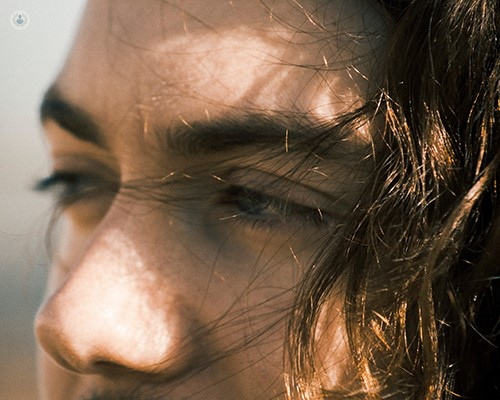What is a rhinoplasty?
Escrito por:A rhinoplasty, more commonly referred to as a nose job, is an extremely common procedure. Esteemed consultant plastic surgeon Mr Amir Sadri discusses what happens during the rhinoplasty procedure, how to prepare and risks linked to the operation.
What is a rhinoplasty?
Rhinoplasty, also known as a nose job, is a surgical procedure that changes the shape of your nose. It’s a popular cosmetic surgery that can help improve your appearance or correct breathing problems caused by structural defects in your nose.

What happens during the procedure?
During rhinoplasty, your surgeon will make incisions to access the bones and cartilage that support your nose. They will then reshape your nose to achieve your desired look. In “closed rhinoplasty,” incisions are made within the nostrils. This is a technique that has a limited ability to make changes.
In “open rhinoplasty,” an incision is made across the tissue between the nostrils as well as within the nostrils.
How do I prepare for a rhinoplasty?
Before rhinoplasty surgery, you may be asked to get a lab test, take certain medications or adjust your current medications, stop smoking and avoid taking aspirin, anti-inflammatory drugs and herbal supplements as they can increase bleeding. You should also purchase sleep aids and ice packs so that they are ready for you when you get home. It is also adisable to stock up on food which is easy to digest, that you can eat easily after your rhinoplasty.
How long is the procedure?
The duration of a rhinoplasty procedure depends on the specifics of the nasal structure and function. Generally, rhinoplasty takes 1.5 to 3 hours and is usually perfromed as an outpatient procedure.
What risks are associated with rhinoplasty?
Like any surgery, rhinoplasty carries risks and potential complications. Some of the risks specific to rhinoplasty include:
- Problems breathing through the nose
- Permanent numbness in and around the nose
- The possibility of an uneven-looking nose
- Pain, discolouration or swelling that may last for a long time
- Scarring
- A hole in the wall between the left and right sides of the nose (septal perforation)
Bleeding may be the most common risk of rhinoplasty or revisional rhinoplasty, since blood vessels may be damaged during each surgery. Most patients lose a small amount of blood during surgery and a very small number of patients may experience significant post-surgery blood loss.
It’s important to discuss any concerns you have with your surgeon before your procedure. They can help you understand the risks and benefits of rhinoplasty and determine if it’s right for you.
What is the recovery time for rhinoplasty?
The recovery time for rhinoplasty varies depending on the extent of the surgery and the individual’s overall health. However, most people can return to work or school within a week or two after surgery. You should avoid strenuous activities such as exercise and heavy lifting for at least two weeks after surgery.
During this time, you may experience swelling and bruising around your nose and eyes. You may also have some difficulty breathing through your nose and it is also important to avoid blowing your nose for at least a week after surgery.
If you are considering a rhinoplasty and would like to book a consultation with Mr Sadri, do not hesitate to do so by visiting his Top Doctors profile today.


